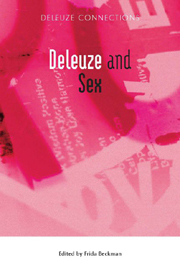Book contents
- Frontmatter
- Contents
- Acknowledgements
- Introduction: What is Sex?: An Introduction to the Sexual Philosophy of Gilles Deleuze
- 1 Alien Sex: Octavia Butler and Deleuze and Guattari's Polysexuality
- 2 Heterotica: The 1000 Tiny Sexes of Anaïs Nin
- 3 Haemosexuality
- 4 Disability, Deleuze and Sex
- 5 Tongue and Trigger: Deleuze's Erotics of the Uncanny
- 6 (Hetero)sexing the Child: Hans, Alice and the Repressive Hypothesis
- 7 The ‘Non-Human Sex’ in Sexuality: ‘What are Your Special Desiring-machines?’
- 8 Deleuze and Selfless Sex: Undoing Kant's Copernican Revolution
- 9 A Preface to Pornotheology: Spinoza, Deleuze and the Sexing of Angels
- 10 Encounters of Ecstasy
- 11 Beyond Sexuality: Of Love, Failure and Revolutions
- Notes on the Contributors
- Index
11 - Beyond Sexuality: Of Love, Failure and Revolutions
Published online by Cambridge University Press: 12 September 2012
- Frontmatter
- Contents
- Acknowledgements
- Introduction: What is Sex?: An Introduction to the Sexual Philosophy of Gilles Deleuze
- 1 Alien Sex: Octavia Butler and Deleuze and Guattari's Polysexuality
- 2 Heterotica: The 1000 Tiny Sexes of Anaïs Nin
- 3 Haemosexuality
- 4 Disability, Deleuze and Sex
- 5 Tongue and Trigger: Deleuze's Erotics of the Uncanny
- 6 (Hetero)sexing the Child: Hans, Alice and the Repressive Hypothesis
- 7 The ‘Non-Human Sex’ in Sexuality: ‘What are Your Special Desiring-machines?’
- 8 Deleuze and Selfless Sex: Undoing Kant's Copernican Revolution
- 9 A Preface to Pornotheology: Spinoza, Deleuze and the Sexing of Angels
- 10 Encounters of Ecstasy
- 11 Beyond Sexuality: Of Love, Failure and Revolutions
- Notes on the Contributors
- Index
Summary
The process of hominisation ‘takes’ in us, the way a crystal undergoes a phase change and solidifies: does becoming human consist of forever unbinding so as to be elsewhere and otherwise?
(Serres 1995: 101)To be contracted by another person into a single being – how strange.
(Woolf 2000: 49)Desire and Failure
Sometimes people complain that too many philosophers say they are talking about sex, but then say little or nothing about the important issues that one might expect them to address. If such is the expectation, this chapter will be another cause for disappointment. Discussions of sexuality and desire in the work of Deleuze are not what ‘common sense’ might lead us to expect. The erotic is demystified, less ecstatic than a dimension of everyday encounters, habits, practices and even infrastructures. Intimacy is ‘de-sexualised’ and non-appropriative, creative of in-between spaces and interstices; the intimate distances of ‘becomings’, of trust and its relation to democracy. One imagines here moments like sitting in a ward, drawing or gently massaging the bodies of women who are HIV+ with stage 3 or 4 AIDS, or the tender camaraderie of a group of ex-political prisoners which forecloses ready stereotypes about men and soldiers, or an ant struggling to climb up a leaf, writing, or the look in a student's eyes at the encounter with a new thought. Sexuality and desire are not narrowly defined in Deleuze and Guattari's work as they are in other discourses and in ordinary speech.
- Type
- Chapter
- Information
- Deleuze and Sex , pp. 217 - 237Publisher: Edinburgh University PressPrint publication year: 2011

